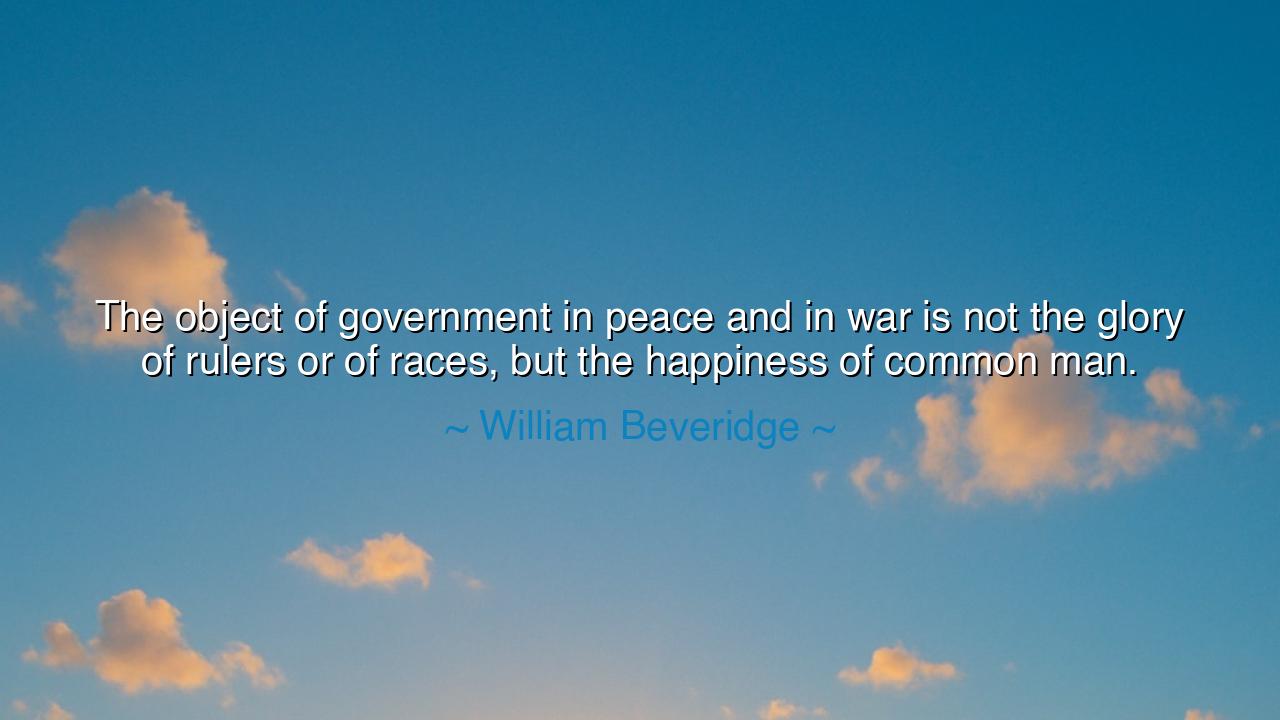
The object of government in peace and in war is not the glory of
The object of government in peace and in war is not the glory of rulers or of races, but the happiness of common man.






The words of William Beveridge shine like a golden inscription upon the tablets of civilization: “The object of government in peace and in war is not the glory of rulers or of races, but the happiness of common man.” In these words, the architect of Britain’s postwar welfare state spoke not as a politician, but as a philosopher of humanity. His vision, born amid the ashes of World War II, was a call to all generations—that the true purpose of power is not conquest, nor pride, nor the applause of history, but the quiet and enduring happiness of ordinary people. For what good is a nation mighty in battle if its children hunger? What glory can there be in empire if its citizens live in despair?
In the style of the ancients, let us see this not merely as a political statement, but as a sacred truth about the nature of leadership. The ruler who seeks his own fame builds his kingdom upon sand, but the ruler who seeks the joy of his people builds upon stone. Throughout history, the great divide between tyranny and justice has always been this: the tyrant pursues glory, the servant of the people pursues goodness. Beveridge, writing in a time when nations were torn by war and want, dared to dream of a new order—not built on the might of armies, but on the dignity of every human life.
He lived in the Britain of the 1940s, when bombs had fallen on London and hearts had grown weary. Yet from the ruins arose an idea mightier than any weapon—the belief that government should care for all, not as charity but as duty. From this belief was born the Welfare State, and with it the promise of health, education, and security for every citizen. It was a revolution not of blood, but of compassion. Beveridge’s words were the seed of a nation’s moral awakening—a reminder that the measure of greatness lies not in the triumphs of generals, but in the well-being of the common man.
The ancients, too, glimpsed this truth. When the philosopher-king Marcus Aurelius ruled Rome, he wrote that “the fruit of the good life is the good of others.” Though emperor of the known world, he saw his throne not as privilege, but as burden—a sacred trust to ensure the people’s peace. In him, as in Beveridge, we see the eternal contrast between vanity and virtue, between the fleeting splendor of empire and the enduring legacy of justice. For when rulers seek glory, the people suffer; but when rulers seek the people’s happiness, the world itself grows brighter.
And yet, Beveridge’s wisdom speaks not only to rulers, but to all who live in society. For a government is not an abstraction—it is the mirror of its people’s soul. If citizens prize greed over goodness, or honor power more than mercy, they will be governed by those who reflect that blindness. But if the people value compassion, equity, and shared destiny, they will summon forth leaders who build peace instead of monuments to pride. Thus, the happiness of the common man is not merely the government’s task—it is the shared labor of all who call themselves free.
Think of the nations that forgot this truth: those who exalted race above reason, might above morality. The twentieth century is stained with the memory of dictators who promised greatness but delivered ruin. They built statues to themselves while their people starved, waged wars in the name of glory while their sons died in fields of mud. But those who remembered the humble—those who healed the wounded, fed the poor, and sought fairness rather than fame—became the true builders of civilization. Their triumphs were not shouted in parades, but whispered in the laughter of children who slept safely at night.
So let this be your lesson, O reader of future days: the greatness of a nation is measured by the happiness of its least powerful citizens. When you stand to choose your leaders, choose those who listen, not those who boast. When you labor, do so not for pride, but for purpose. And in your heart, remember that peace is not the silence of guns, but the presence of justice, compassion, and shared joy. The government that serves happiness serves the divine; the one that serves glory serves only dust.
For as Beveridge taught, the destiny of humankind lies not in empires or banners, but in the simple, sacred promise that every soul deserves dignity. When rulers forget this, the world burns. But when they remember, even the ashes bloom again. Thus, seek not the glory of rulers—but the happiness of the common man, and in that humble pursuit, you shall find the true majesty of humanity itself.






AAdministratorAdministrator
Welcome, honored guests. Please leave a comment, we will respond soon